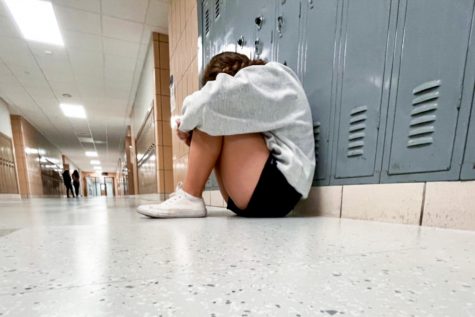The isolating return from isolation: Post-pandemic comfort stunts social regrowth among teenagers
October 23, 2021
Zoom meetings and FaceTime calls became people’s regular idea of socializing for almost 19 months and now that we’re moving back to “normal life” the increase of social and general anxiety has been exponential, especially amongst teenagers.
According to the C.S. Mott Children’s Hospital National Poll on Children’s Health, 46% of parents with adolescents have seen new or worsening symptoms of social anxiety and depression since the pandemic started. As the idea of isolation became just a part of everyday life, the fact of loneliness became more and more relevant.

Senior Kyla Wasler touches on how much her social life had changed throughout the many lockdowns we experienced.
“I don’t really go out as much as I used to. Now, I just want to stay at home all the time; It’s more comfortable for me,” Wasler said.
Wasler explained how her motivation from school to hanging out with friends has been jeopardized over the time of the pandemic. She further shared how the comfort of her home has created a lack of inspiration in the social aspect of her life.
“I don’t enjoy it as much as I used to, I mean everyone kind of changed in how they act around others and it’s so much more difficult to gain that motivation to go and talk to someone, I guess it’s just easier to stay home,” Wasler said.
The comfort of home has become the “easy” way out as Wasler explained. More and more teenagers have avoided the task of practicing their social skills with their peers by entering the black hole of Netflix and social media, ultimately regressing their motivation.
DGS Psychologist Teriauna Bland shared the effects of COVID-19 she has seen in her students, as well as positives, in terms of adjusting to this new normal.
“[I have seen] the inability to socialize as they would like due to feeling there is an immense amount of homework they have to complete or are adjusting to complete,” Bland said.
Bland further expresses her belief of the cause of this new widespread anxiety and loneliness amongst teens. She adds a different view, possibly implementing a positive outlook on how adolescents in their old learning environment.
“The pandemic and specifically quarantines have impacted [people] in many different ways. For some with social anxiety disorder, remaining home without the expectation of being around others may have felt advantageous… While [we] may argue the potential for some to practice skills in a physical setting presented a challenge, perhaps working in a virtual setting from the comfort of home or a more familiar environment presented opportunities for exponential growth [for learning],” Bland said.
Lately, we have seen our society return to a world of normality with the exponential rate of vaccines and mask-mandates. DGS Psychologist Catherine Robinson, explains the very first steps on how to gain those social skills back.
“[The] first step is identifying [whether] there’s a struggle/problem or not. Self awareness can help a person feel empowered and integrated with life, people, and society again. [It’s all about] taking baby steps,” Robinson said.
Bland and Robinson encourage those who need extra help, or just someone to talk to, to visit the counseling center at DGS, where an adult can help.